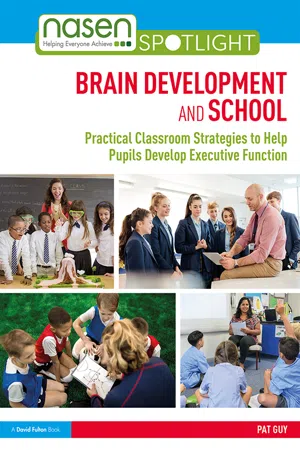![]()
What is executive functioning?
• Potential problems for pupils.
• Nature and/or nurture.
• Executive functioning in the classroom.
• Issues for the primary child.
• Issues for the secondary pupil.
Executive function is the term used to describe the control system of the brain that enables the individual to organise and plan their actions. In the absence of this control system, individuals would react to situations instinctively and without due consideration. The executive functioning system distributes information entering the brain, allowing the individual to plan and direct their response, manage their behaviour, use their memory, maintain concentration and focus their attention.
Different areas of the brain are controlled by the executive functioning system and work together to produce the best outcome for the individual, for example:
• To problem solve, the pupil must be able to identify and focus on the most important aspects of information, hold all relevant facts in working memory and shift their attention back and forth between the different choices that could be made.
• To avoid procrastination, a pupil must have good self-regulation, control any impulse to divert their attention to something more appealing and remember the problems that procrastination has led to in the past.
A weakness or deficit in any one area of this processing system will have an effect on the individual’s overall executive functioning.
The brain develops from birth through childhood into adulthood, completing development by the time most individuals are in their mid-twenties. There are two occasions during this gradual development when the brain undergoes significant change: the first being from birth to two years of age and the second during puberty. On both occasions, large numbers of brain cells are created, new connections established and under-used connections pruned. This pruning enables the brain to work as effectively as possible and complete routine activities with increased efficiency.
As brain development occurs throughout childhood and adolescence, schools have the opportunity to play a significant role in the development of this aspect of neurological functioning.
Neurological experts have identified between five and twelve aspects of executive function: however, as many of the aspects overlap or are inter-dependent, too much sub-division becomes an artificial exercise.
Pennington and Ozonoff (1996) describe four closely related domains of executive functioning: inhibition, cognitive flexibility, working memory and planning/initiation, in addition to the ability to self-monitor and maintain emotional control.
Dawson and Guare (2010) identify ten aspects of executive functioning: working memory, planning, organisation, time management, flexibility, inhibiting response, emotional control, sustained attention, persistence and task initiation.
Potential problems for pupils
Weaknesses in these aspects will give pupils problems in school such as:
• Working memory. A difficulty remembering and following the steps of a process: the sequence required to solve a Maths problem or the stages to be followed in a Science experiment.
• Planning. A problem with planning extended pieces of coursework or an individual project.
• Organisation. The pupil will seem unable to organise themselves or to keep desks, lockers and other personal spaces tidy.
• Time management. A problem devising and managing revision plans or allocating study time sensibly between different subjects.
• Flexibility. Difficulties in identifying and pursuing alternatives if initial plans are not successful or need adaptation.
• Inhibiting response. A tendency to respond immediately, before considering the possible consequences of their action. The pupil cannot resist the urge to call out in class or appears incapable of waiting for their turn in a game.
• Emotional control. The child with weak executive functioning will react to situations without stopping to think; perhaps losing their temper in response to apparently minor irritations. They will find it difficult to recover emotional stability and to move on from frustration or disappointment.
• Sustained attention. The pupil will be unable to concentrate long enough to complete tasks within the time allowed or to the required standard.
• Persistence over time. The child will be unable to delay gratification, for example, saving pocket money over a period of time in order to fund a school trip.
• Task initiation. The pupil will have difficulty starting work promptly, delaying necessary action until the last minute.
Dr Thomas E. Brown of Yale Medical School (2013) identifies six domains of executive functioning that group the aspects identified above: action, activation, effort, emotion, focus and memory.
Action
This aspect of executive function refers to the individual’s ability to monitor, track and evaluate their actions. Pupils who experience a difficulty in this area will not be self-aware and will be unable to tell if their study strategies work or not. They may not realise that they need to have strategies and have no idea how to monitor their success. They will experience difficulties with social situations, failing to notice if they are annoying their peers and modifying their behaviour accordingly. It is difficult for these children to interpret social situations and they are likely to come to inaccurate conclusions about the intentions of others.
Activation
The activation aspect of executive function refers to the individual’s ability to motivate themselves in preparation for work, including estimating the amount of time required to complete tasks. The pupil will need to think about the work, what action they must take, plan and prioritise the necessary sequence of steps and then complete the activity to an adequate standard. If pupils experience a problem with the activation aspect of executive function, they will seem unmotivated or to be procrastinating, but they may feel so overwhelmed by the task facing them that they find it easier to do nothing. However, any delay and avoidance will only serve to exacerbate their problems. Sanctions will not always have the desired effect and even when the child is punished for their poor attitude, they appear unable to correct their behaviour.
Effort
This aspect of executive function relates to the individual’s ability to regulate and sustain their level of effort. The pupil will claim that they need to work to a tight deadline in order to galvanise themselves into action. This would be a useful personal attribute if they plan to move into a high-pressure working environment as adults, but is not an effective approach to school work, where research points to a ‘little and often’ work ethic being the more successful strategy. Pupils will be capable of completing short-term projects to an adequate standard, but have difficulty sustaining their effort over longer periods of time. They find it hard to stay alert in school, appearing tired during the day for no apparent reason. They may fall asleep in lessons and report general difficulties with sleeping at night, disturbed sleep patterns and problems with waking and getting out of the house in the morning.
Emotion
Pupils with a deficit in this aspect of executive function will find it difficult to manage and moderate their emotions. They will over-react to small injustices and struggle to focus and continue with an activity if something or someone upsets them. They find it extremely difficult to keep their emotions in perspective, to put imagined slights to the back of their minds and carry on with what they need to do. It can be almost impossible for them to regulate feelings of frustration, anger, worry and disappointment.
Focus
Focus refers to the individual’s ability to concentrate and maintain attention whilst working on an activity, and then to shift their focus as required by the task. These pupils will be distracted continually by everything that is going on around them, even their own thoughts. They will be disturbed by noises, movement and smells that their peers simply do not notice. They will have problems with over-attention as well as under-attention, becoming so engrossed in an activity that they are unable to switch off and start something new.
The pupils lack the flexibility required to think of a new approach if their original plan fails. They cannot see other options or solutions, finding it difficult to change their course of action and becoming anxious if they’re asked to do so.
Memory
There are several types of memory, but the one that gives these children most difficulty in school is working memory. Working memory entails retaining information mentally, and then using the information to complete another task. Pupils with a weak working memory will experience a difficulty with multi-stepped tasks: remembering and then following through oral instructions, holding information in mind while taking notes from classroom discussion, or remembering, and then using, their number bonds and tables to solve a mathematical problem.
Unfortunately, many school activities require such memory skills. For example, even when a child is a competent reader and able to decode the written word, they will need to use their memory to recall the relationships between the characters in a text, the overall plot, the action over several chapters, the different characters’ names and any sub-plots.
The children’s problems with memory will be compounded by any additional executive functioning weaknesses they experience: a difficulty in maintaining concentration, regulating effort or monitoring their performance over time.
Any of the weaknesses described above will cause the pupil frustration and erode their self-confidence. Although adults in the school may be irritated by the child’s actions, it is important to realise that the child’s behaviour may not be deliberately non-compliant, but occur as a result of genuine incompetence. They are not neurologically mature enough to do what is required of them.
Periods of transition, notably between junior and senior school, often provide a catalyst for the emergence of executive functioning problems. At the end of Key Stage 2, children will move from the comparatively sheltered environment of the primary school (familiar teachers, smaller numbers of children and ‘hands on’, experiential learning) into the more impersonal, subject-focused teaching environment of a larger secondary school. While most primary teachers will have some experience of teaching across the primary age group, and most secondary teachers have some experience of teaching across Key Stages 3 and 4, secondary teaching and support staff may have little understanding of the behaviour that could be expected from Key Stage 1 and 2 pupils. A pupil may seem verbally astute, but be unable to structure their knowledge in written form, find it impossible to take accurate notes at speed or unable to maintain concentration through extended periods of teacher talk. An inability to cope may be misinterpreted as attention seeking, silliness, a lack of intelligence or deliberate non-cooperation.
Some children may appear to overcome their difficulties after an initial hiccup, only for them to reappear at a later stage. Their problems will not have disappeared; the children will have coping strategies that need updating in order to deal with the new situations in whic...





